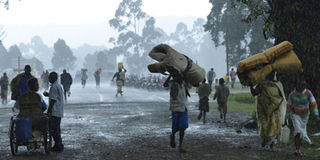DR Congo army launches assault on last rebel holdouts

PHOTO | JUNIOR D.KANNAH Congolese refugees, returning from Uganda, walk back home on November 1, 2013, in Bunagana, 99 kms from the eastern Democratic Republic of Congo city of Goma, at the frontier with Uganda.
What you need to know:
- The clashes have forced thousands from their fields and homes, and aid agencies estimate some 10,000 refugees have streamed into Uganda
- The M23 movement was founded by ethnic Tutsi former rebels who were incorporated into the Congolese army under a 2009 peace deal but then mutinied in April 2012
KIWANJA
The Democratic Republic of Congo army said Sunday it has launched a new offensive against rebel fighters who fled to the hills after being ousted from their last stronghold.
"We are pounding Mbuzi," one of three mountains in eastern DR Congo where the rebels are hiding, General Lucien Bahuma told AFP by telephone. "After the artillery we will send in the troops."
Some 200 die-hard fighters of the M23 rebel group have been holed up in the mountainous region bordering Uganda since their base in the town of Bunagana was seized on Wednesday.
"They are claiming back the hills. There is shooting in the mountains of Ntamugena, Mbuzi and Runyonyi. The rebels are fleeing," a DR Congo captain told AFP, speaking anonymously.
The sound of heavy artillery could be heard from Kiwanja, a town around 20 kilometres (12 miles) away.
STAMP OUT INSURGENCY
The lush green hilly region bordering Uganda has been rocked by heavy fighting for the past 10 days as army troops battle to stamp out the insurgency once and for all in the restive, mineral rich North Kivu province.
The clashes have forced thousands from their fields and homes, and aid agencies estimate some 10,000 refugees have streamed into Uganda.
'There was a lot of shooting'
In a muddy field barely a kilometre inside the Ugandan border, hundreds of Congolese sheltered from the rain under plastic sheets.
Among them Noella Bigumashyaka, a 26-year-old teacher from the village of Jomba who fled for Uganda on Wednesday.
"I have two of my children with me, but I don't know what happened to the other two, they are only five and eight," she said weeping.
"There was a lot of shooting. We ran too quickly, abandoned our belongings along the road. We're dirty but we can't change our clothes."
For some it was not the first time they had to flee fighting in the notoriously unstable region which has seen two major wars in the past two decades fought over control of the former Belgian colony's mineral resources.
Jean-Nepomuscene Twizerimana recalled having to leave his home as a child in 1998, when fighting raged between two rebel groups, the Tutsi RCD and the extremist Hutu FDLR, and again in 2005 as well as last year when the M23 rebels moved in.
"When the M23 were there we were under the authority of rebels, people were miserable, because there was no peace," the 20-year-old said.
"But now the government has come in and nothing has changed... because we are now refugees here."
The M23 movement was founded by ethnic Tutsi former rebels who were incorporated into the Congolese army under a 2009 peace deal but then mutinied in April 2012, claiming that the pact had never been fully implemented.
At their strongest in November last year, M23 marched into Goma, a mining hub and city of one million people, and took control for 10 days, before regional leaders persuaded them into fresh peace talks.
But the stop-start talks fell apart last month when Kinshasa refused amnesty for about 80 rebel leaders and the DR Congo army -- backed by a special United Nations force -- went on the attack in a bid to end the rebellion.





